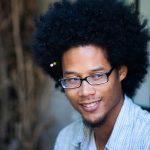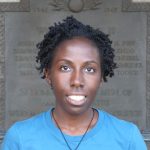aking Worlds is a bookstore and social center that recently opened in West Philadelphia, Pennsylvania. Their mission is to create “a powerful space for community to imagine and build collective self-determination in the face of climate catastrophe.” I spoke to Malav Kanuga, co-founder of the bookstore about their worker cooperative model, the pains of starting up a bookstore and social center, and their vision for the future.
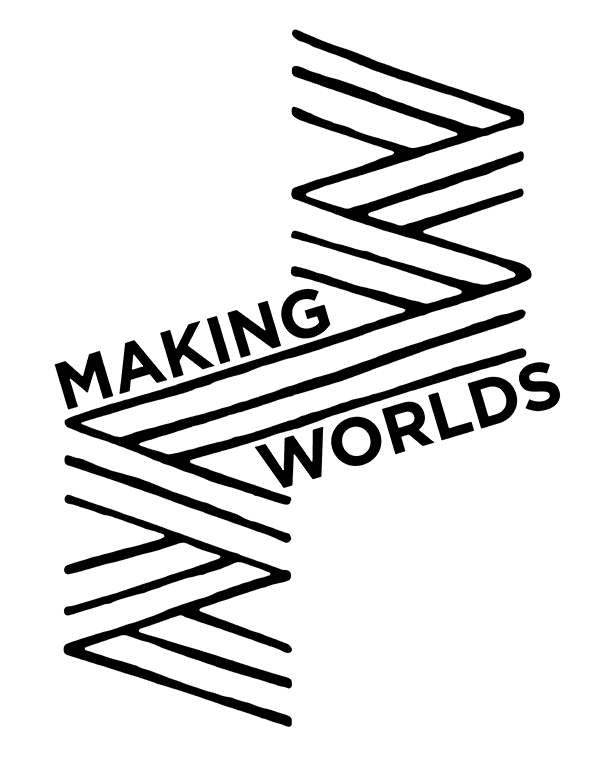 First thing’s first: how did you decide to open a bookstore?
First thing’s first: how did you decide to open a bookstore?
Well, personally, I’ve spent the majority of my life at this point in collectively-run spaces like DIY music venues, infoshops, bookstores, libraries, and archives. They are such an enormous part of how I’ve been trained and mentored in movement work, where I’ve been educated, and where I’ve met and sustained so much of my community. I was involved in the workers’ collective at Bluestockings Bookstore on the Lower East Side of Manhattan for a long while and my time there was so formative, I suppose it was inevitable that I’d return to that work.
The idea of Making Worlds evolved organically out of a number of conversations through some very new and inspiring friendships with other abolitionists, with whom I share political leanings and sensibilities around hospitality. It was a bit serendipitous and brazen, but we had a vision and enough skills between us to get things going. We also realized we had interesting, unique, and complementary experiences in bookselling, and wanted to explore what it would look like to combine those experiences and make a used and new bookstore.
How do you see the social center side of it being utilized? Pretty much all bookstores offer readings and host the occasional workshop. What makes Making Worlds different?
We also always imagined ourselves as a social center, a space where different groups can organize all kinds of things. Our focus as a bookstore and an organizing space is also trying to consciously bring together various—even divergent—strands of abolitionist organizing and also to look at what Black, Brown, and Indigenous traditions of liberation and especially self-determination look like in the context of climate catastrophe. What does climate-adapted autonomy and ecological self-determination look like and how is it rooted in ongoing work around anti-displacement and anti-gentrification, anti-police and prison work, abolitionist alternatives to incarceration, food insecurity, the closure of public schools in the area, and other issues—all of which are happening in the neighborhood and in the city? And how can we connect to other projects for autonomy in the country, in other towns and cities, as well as internationally?
That’s a big agenda. I think the first thing we identified was an opportunity and, in a sense, a responsibility to take our various experiences and expand them with others to create a physical space that could be a resource to support existing community organizing and citywide movement work, as well as a space that hopefully can help hold the line (and push back) against university-led gentrification in West Philadelphia.
“Our focus as a bookstore and an organizing space is also trying to consciously bring together various—even divergent—strands of abolitionist organizing.”
Why in West Philly?
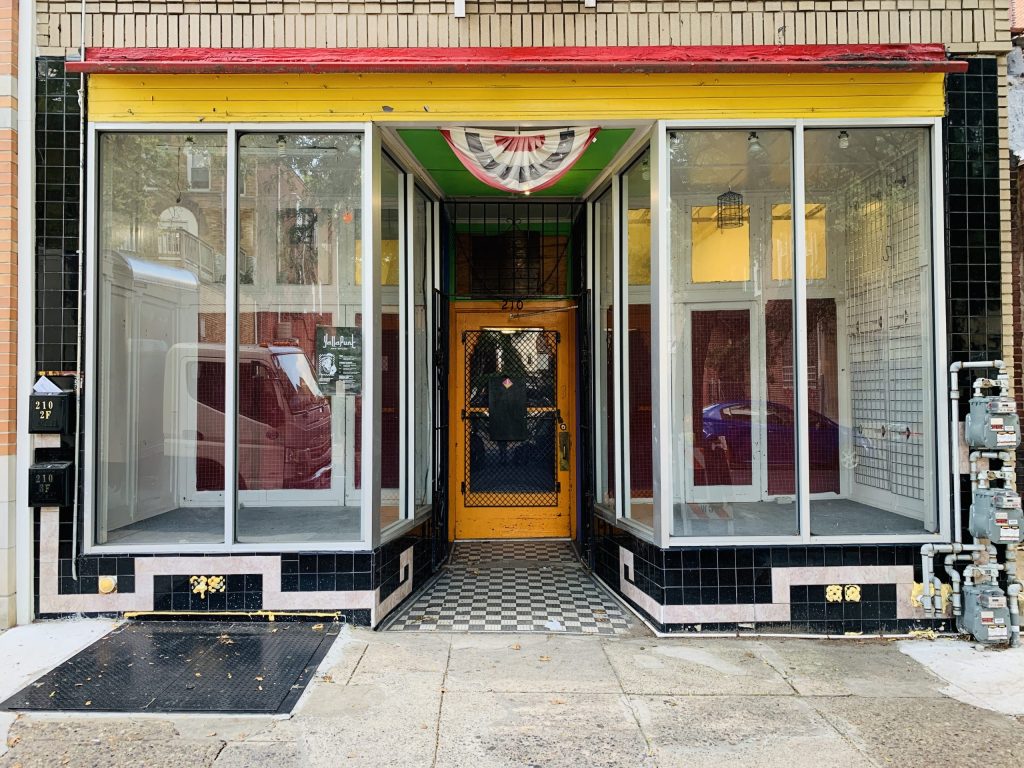 Well, again personally, I spent my life visiting Philadelphia. It’s where, in the mid-nineties, I first learned about political prisoners like Mumia Abu-Jamal and the MOVE 9, and had any tangible connection to the history of the Black Panther Party and the MOVE organization. It’s where I’d go for warehouse shows and punk house parties and eat tofu hoagies. And it’s where I discovered radical bookstores like Wooden Shoe.
Well, again personally, I spent my life visiting Philadelphia. It’s where, in the mid-nineties, I first learned about political prisoners like Mumia Abu-Jamal and the MOVE 9, and had any tangible connection to the history of the Black Panther Party and the MOVE organization. It’s where I’d go for warehouse shows and punk house parties and eat tofu hoagies. And it’s where I discovered radical bookstores like Wooden Shoe.
Over the years, this is the neighborhood where I’d most often come to connect with inspiring organizers, activists, artists, and revolutionaries living and doing work in the neighborhood. I live here now, and helping to build a physical space in the place I live, with friends and neighbors and long-term residents of the neighborhood seemed like a really important dream to realize. For my part, a lot of this project is also an extension of the publishing work we’re doing with Common Notions, and my friendships and work with Mike Africa, Jr. and his parents, Mike and Debbie Africa (who recently came home from prison after over forty years) really centered my thinking about the ongoing struggles in the neighborhood in the context of its radical history. (The MOVE headquarters on Osage Ave and the other houses in Powelton Village are part of the history of these neighborhoods.)
Mumia Abu-Jamal was fifteen when he helped found the Philadelphia branch of the Black Panther Party. Common Notions published the new and expanded edition of his incredible memoir We Want Freedom: A Life in the Black Panther Party and on the inside title page is a photo of a very young Mumia sitting in the storefront office of the BPP, on the phone. What can we do with a storefront today and how can we continue to learn from, renew and extend the legacies of the city’s revolutionary history? We are working to build our capacity to make Making Worlds a revolutionary social center pending revolution. That really has been part of the vision since the beginning of our planning.
In a city and a neighborhood that is majority Black, the block where we are located is an incredible crossroads for Black, Caribbean, North African, Ethiopian, Palestinian, Lebanese, Yemeni, Bangladeshi, and South Asian small businesses and community spaces. There are other important community organizing spaces in the neighborhood already, like Philadelphia Student Union or LAVA, or coops like Mariposa Food Co-op, and really important bookstores, too, like Hakim’s on 52nd street. This whole area was and continues to be a battleground for gentrification from the “Black Bottom” to what is now referred to as “University City.”
These all create an important set of dynamics and relations in the neighborhood (which is really a lattice of many micro-neighborhoods). There are layers and histories of different communities moving in and out of this neighborhood. The story is complex and lots of folks know it far better than I do. I hope those stories can be shared through oral history and conversations among new friends, as well as discussions and workshops in the space. I also hope Making Worlds can vibrate with the existing relations and dynamics of our longstanding neighbors and immigrant communities and that we can grow additional bases of understanding and cooperation in the areas that help all of us identify the bases of resistance to displacement and white and university-led gentrification that is rampant in the neighborhood.
“We are working to build our capacity to make Making Worlds a revolutionary social center pending revolution. That really has been part of the vision since the beginning of our planning.”
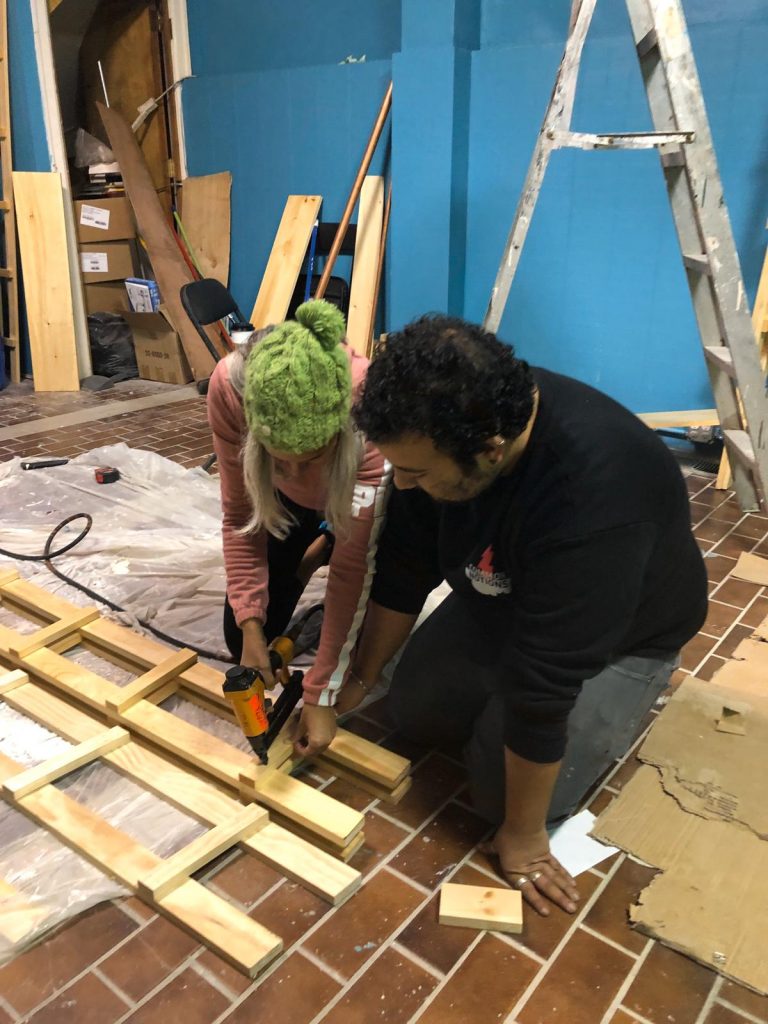 Making Worlds is structured as a non-profit but organized as a worker cooperative. Why did you want to go with that combination?
Making Worlds is structured as a non-profit but organized as a worker cooperative. Why did you want to go with that combination?
We wanted to create a space that is cooperatively-run and managed by its workers without bosses, that is internally democratic and responsive to the communities around us. We’ve expanded our worker collective through a really generative process of community dialogue and interviews and are now a ten-person team that is almost entirely Black and Brown workers, and majority folks who were born and raised in Philadelphia. Having been involved in a number of other movement spaces as well as a worker-owned business, at the outset, I was interested in exploring a different model of “ownership” too, that first of all projects an understanding that we are not selling books to make a profit. I’ve never worked in a nonprofit setting, but of course I understand the enormous drawbacks to the nonprofit model (and others in our co-op have and continue to work in nonprofits and are very clear about their limitations for really radical ways of working together). But we hope that the limited grant writing and foundation support we may rely upon from time to time will allow us to do some real principled redistribution work of getting that money back into a community social space that is building autonomy and collective self-determination. Our conception is that if we are successful, our community is successful. Our livelihoods and well-being are rooted in the well-being of the communities around us, not just in the immediate sense, but over the long haul—and that takes a lot of conversations, building trust and histories with others, and supporting each other’s organizing work, struggling together, and hopefully helping to build some real power dispersed across a lot of different organizations.
Perhaps a more traditional business that is making money selling books and coffee in the neighborhood would be welcome, but it’s not really a departure from what is imaginable. The nonprofit status at least indicates that we are thinking of ourselves consciously as workers (hence the worker cooperative part) that are stewarding resources that can sustain really open public-facing movement work in dialogue with many others. There is, of course, a responsibility to sustain the livelihoods and well-being of all the members of the worker cooperative, but there isn’t a profit incentive. What’s interesting is that working with this nonprofit/cooperative model, we’ve been asked quite a few times, what are you going to do if you make a surplus? Well, that is a really interesting and important opportunity to do more mission-oriented project work, perhaps support others with grants, help build some infrastructure in the community, and fundamentally, if managed well, also reshape commonsense ideas of “ownership” and to ask with whom do we “own” our wealth.
You’re also part of Common Notions, a radical independent publisher that has grown over the years. How has your work on the publishing side informed your experience on the bookselling side?
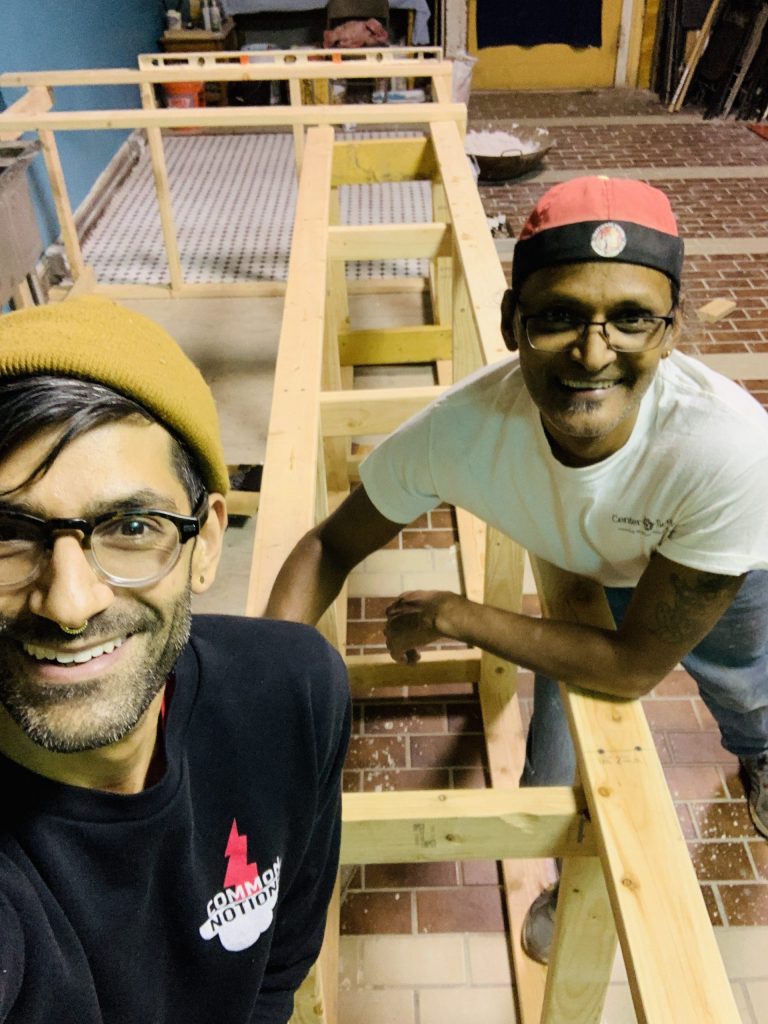 Well, Making Worlds is so much more than this, but it is also in part a collaboration with Common Notions. There are two of us in the bookstore collective that are also part of Common Notions and our Philadelphia office is in the back of the store (and warehousing in the basement).
Well, Making Worlds is so much more than this, but it is also in part a collaboration with Common Notions. There are two of us in the bookstore collective that are also part of Common Notions and our Philadelphia office is in the back of the store (and warehousing in the basement).
As a publisher, I am aware of the enormous labor that folks in the book trade put into the books they publish and how important it is to have spaces where authors can meet their would-be readers; where discoveries are made, and new conversations are born.
We’re going to be really attentive to the publishing programs of our favorite presses and hope to feature a great collection of important and inspiring books together.
There is also a heavy reliance on celebrity voices in the trade, even among radical publishers. Some of that is fine, some good folks deserve the platform they’ve built; and some of that is kind of the press model because well-known authors sell more consistently and better, and those successes may help pay for other books to come into the world that wouldn’t be commercially feasible otherwise. Still, I’d love for our bookstore to help us all steer away from that individualizing tendency and sustain a culture of collectivity that highlights and celebrates the collective voices that make transformative ideas and movements possible too.
“Our conception is that if we are successful, our community is successful. Our livelihoods and well-being are rooted in the well-being of the communities around us, not just in the immediate sense, but over the long haul.”
What’s been the biggest challenge so far in realizing the space? Besides money, which is presumably always a problem for everyone!
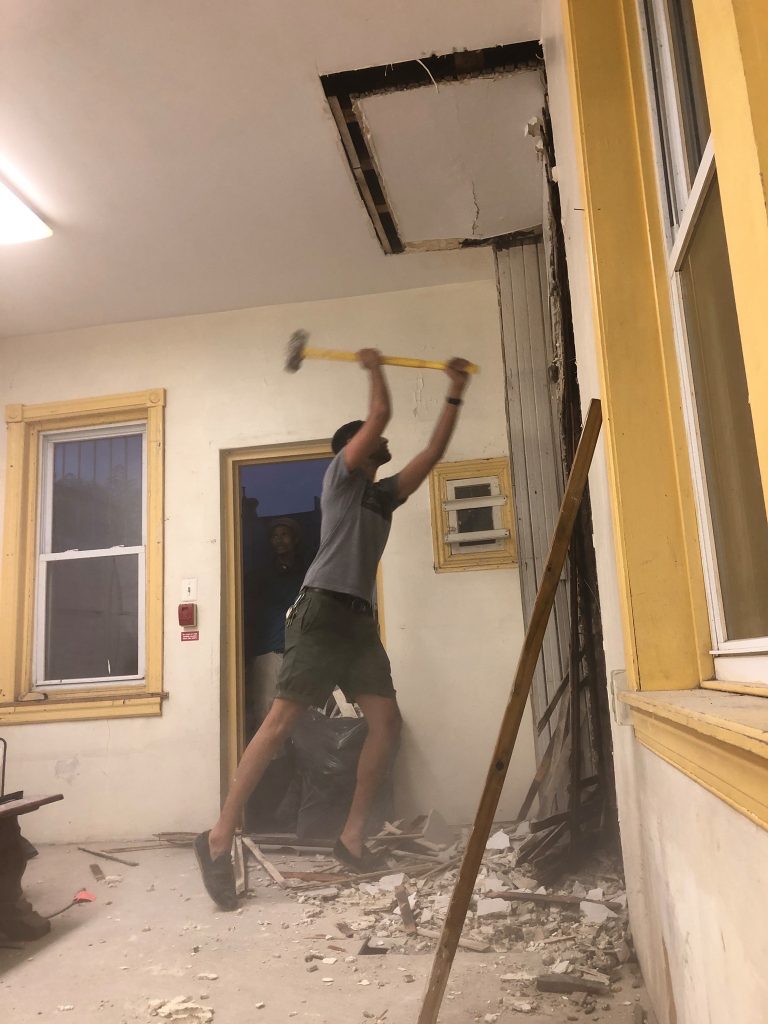 The physical buildout process presented unending complications since we’re inhabiting a storefront space that had a ton of old and weird construction in it from when it served as an annex to our neighbors The Second Mile Thrift store. So the demolition phase was truly bewildering. There were shelves and old fixtures made from every kind of material held together with every kind of screw, bolt, and nail. The electrical setup in the place was a mess, too. Part of the wall was crumbling and the entire ceiling had to be replaced. There were plumbing issues, least of all being there was no bathroom in the space. The storefront and the basement beneath it was full of the oldest dirt, dust, and detritus I’ve ever seen.
The physical buildout process presented unending complications since we’re inhabiting a storefront space that had a ton of old and weird construction in it from when it served as an annex to our neighbors The Second Mile Thrift store. So the demolition phase was truly bewildering. There were shelves and old fixtures made from every kind of material held together with every kind of screw, bolt, and nail. The electrical setup in the place was a mess, too. Part of the wall was crumbling and the entire ceiling had to be replaced. There were plumbing issues, least of all being there was no bathroom in the space. The storefront and the basement beneath it was full of the oldest dirt, dust, and detritus I’ve ever seen.
We are also the first commercial tenants in a long while and the space wasn’t up to code, so we had to take on the responsibility for all that. At the same time, we had to fundraise week after week to pay for city permits, architectural diagrams, contractors, plumbers, electricians, and construction materials. We saw a lot of support through a GoFundMe campaign we set up early on but we were never going to raise all the money to pay for the buildout and have the cash to even get going. So the work required a lot of incremental thinking and planning and improvising. It’s hard and patient work to do on top of full-time jobs, family obligations, health, and other political commitments.
We fortunately have a big community of friends and supporters who came out to physically help us demolish, clean, haul trash, and build the space into what it is today. Very few of us are skilled at this work but we worked collectively and taught each other how to do it. It’s really satisfying to see all the talent and ability that a community holds and how that can be shared with others. Every aspect of the space was collectively transformed in that way. We also have had enormous support from the Philadelphia Area Cooperative Alliance, which has been working with us since early on to help establish ourselves as a co-op and to get access to loans we wouldn’t be able to as individuals.
What sorts of programming can we expect at Making Worlds?
We are programming as a collective of co-op members (each of us throwing in ideas, making connections, setting things up), and are also partnering with poets, authors, filmmakers, and organizers in Philadelphia in a sort of community-supported programming model. These will help us bring poetry, music, and film events together alongside recurring discussions on police and prison abolition, programming by and for the queer and trans community in Philadelphia, news and updates from frontline Indigenous struggles, workshops on land autonomy and ecological struggles, discussions of food sovereignty, anti-gentrification, race traitor workshops for white people, autonomous health and well-being, children’s story time, story slams, and internationalist and anti-imperialist politics.
You can definitely also expect our favorite authors and their publishers being represented here in our mix of events. We’re also running popular education courses and reading groups, anticolonial/antifascist game nights, community justice “flea markets” (for example, to bring health and well-being projects together in one room to serve the community) and we’re hoping to run radical walking and bus tours of West Philadelphia too, coming out of a couple of tours that Mike Africa Jr. has offered of MOVE’s history in the neighborhood.
Two of our founders have also been running a series called “PhilAbolish” out of their living room for the past year or so, but now that we’ve got our space running that will start happening here, too. All of these happenings and conversations that will take place in the space will be too rich not to document—so like everyone else these days, we’re hoping to get a podcast up and running sometime soon too. We’re also going to be hosting assemblies, so folks can plug into our work and participate more directly in shaping what happens in the space.
Making Worlds recently had a soft opening. Congratulations! How can people support your work and get involved?
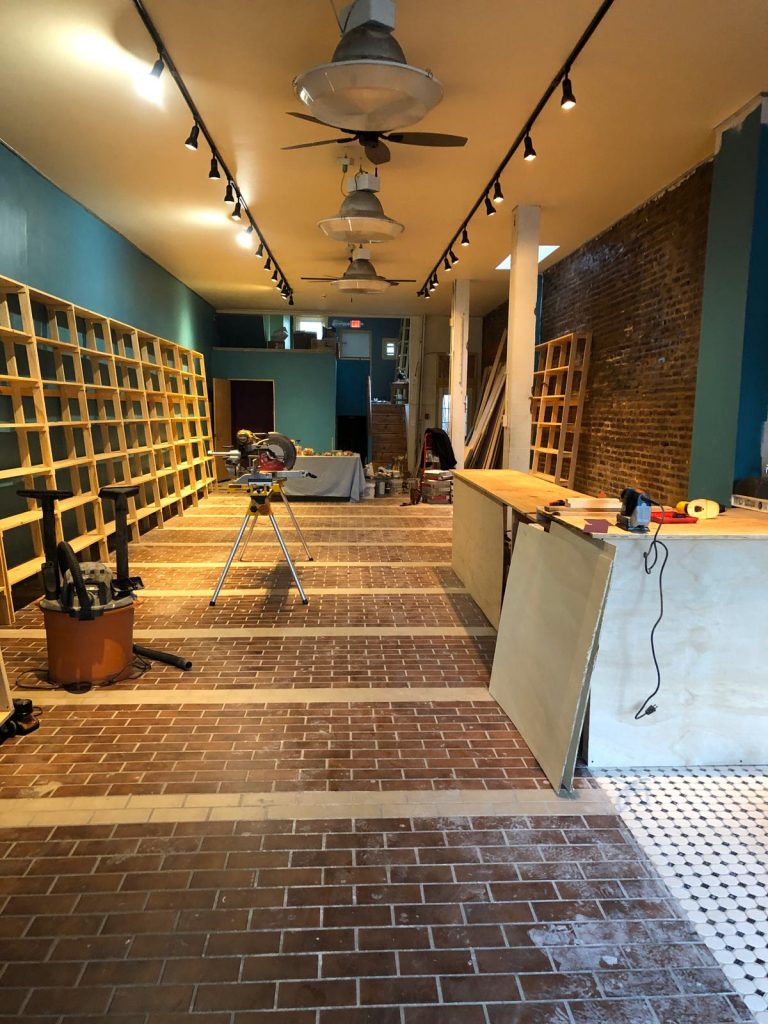 We are likely going to have to keep steady fundraising to make rent and pay back the loans we’re taking out, and make sure we are sustainable as soon as possible so we can meet payroll and benefits for our cooperative members week after week without taking out more loans. So financial support is definitely welcome! We’ve had a GoFundMe so far but will likely be switching to a monthly sustainer program, too—so I’d say stay up to date by coming by often and also checking us out online through social media.
We are likely going to have to keep steady fundraising to make rent and pay back the loans we’re taking out, and make sure we are sustainable as soon as possible so we can meet payroll and benefits for our cooperative members week after week without taking out more loans. So financial support is definitely welcome! We’ve had a GoFundMe so far but will likely be switching to a monthly sustainer program, too—so I’d say stay up to date by coming by often and also checking us out online through social media.
If you have some great books you’d like to donate to us so we can continue to build our used book selection, that would be a great way to support too! There is a big book-loving literary community in West Philly that is unsurprisingly extremely stratified by class, so having a consistently great, high quality used book selection is an important way to organize and expand the conversations we’re having.
Fundamentally, we’d love for you to visit our space and have conversations with us about what you’re reading and how you’re organizing things in your communities. We welcome you to organize reading groups, suggest books to stock, offer ideas about programming, and bring people from your community in for tea or coffee, to browse the shelves, meet new people and mingle.
Spaces like Making Worlds are successful if the communities around them are thriving. Our well-being is directly dependent on that. Let’s get together and build.
Congratulations to Making Worlds on opening! We’re proud to have our titles in stock at the bookstore, so if you’re in West Philadelphia, be sure to stop by and show them some love.
Community Spotlight is a blog series that seeks to connect people and build power. Each post will feature a person or organization doing great work in their community and fighting for a more just world. We interview writers, illustrators, podcasters, filmmakers, activists, and more. Subscribe today and let’s start building together.




